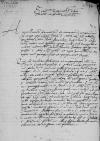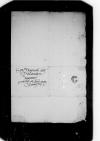Accepi paulo ante ⌊⌋ Serenissimae Maiestatis Vestrae 23 Octobris praeteriti ⌊Cracoviae⌋ datas, ferentes singularem Serenissimae Maiestatis Vestrae erga me gratiam, qua mihi ad oviculas meas adventum salvum favet. Habeo igitur, quas possum, Serenissimae Maiestati Vestrae gratias et rogo humillime, in ea erga me propensione ut perseveret semper.
Quae de reditu ⌊Fabiani⌋ et negotiis per illum in curia ⌊caesaris⌋ gestis Serenissima Maiestas mihi scripsit, non potuerunt me non afficere, qui nihil aliud curavi et in hoc incubui sedulo, quam ut Serenissimae Maiestati Vestrae et votis eiusdem perpetuo felicissime cederet, id ipsum perspectum et iam pridem compertum habere Serenissimam Maiestatem Vestram omnino mihi persuadeo. Qua de re quicquid adhuc in servitium Serenissimae Maiestati Vestrae his in rebus umquam praestare potuero, nihil est, quod facturus sum libentius scripturusque sum paulo post et ipsi ⌊caesareae maiestati⌋, et amicis in curia neque immerito expostulabo amicum tamen in modum, si adhuc aliquid in rem Serenissimae Maiestatis Vestrae extorquere possem mittamque proprium nuntium cum his litteris usque ⌊Cracoviam⌋. Magno fuit rebus Serenissimae Maiestatis Vestrae impedimento aegritudo domini ⌊Valdesii⌋, qui [u]tinam vivat et convaleat, non futurus est a votis Serenissimae Maiestatis Vestrae, quantum in illius facultate fuerit, alienus et, ut spero, non fallar.
Mittam nuntium illum meum ad serenissimam ⌊maiestatem regiam⌋, cui humillime supplicabo, quo serenissima maiestas eius me habeat excusatum a muniis publicis et a conventibus adeundis ad duos annos et praesertim ad ⌊conventus regni⌋, quandoquidem intra hoc tempus ⌊episcopatum meum⌋ egredi non possum, nisi prius solutis debitis, quorum adhuc non parva pars restat; et cum illa in servitio et pro honore atque commodo ⌊utriusque serenissimae maiestatis⌋ contraxerim, supplico humillime, dignetur ad serenissimam ⌊regiam maiestatem⌋ intercedere, ut exemptus ad profectiones et contributiones ad duos annos esse possim. Nequaquam enim, nisi iterum novis et gravibus debitis implicatus, domum meam, in qua, quantum possum, tenuiter vivo, ad duorum annorum spatium exire valeo. Qua in re singularem Serenissimae Maiestatis Vestrae gratiam imploro.
Est mihi hic bonus dominus et vicinus magnificus ⌊Felix Srzenski de Sokolowa⌋ palatinus et capitaneus Plocensis, cum quo mihi a multis annis optime convenit et libenter illi pro eius virtute et apud omnes optima existimatione inservirem et nescio alio modo, quam ut illi, si quicquam preces meae in oculis Serenissimae Maiestatis Vestrae habent momenti, gratiam Serenissimae Maiestatis Vestrae, quantum possem, co<n>ciliarem maiorem. Supplico itaque Serenissimae Maiestati Vestrae, ut dominae meae clementissimae, dignetur bono huic Serenissimae Maiestatis Vestrae ⌊servitori⌋ in omnibus, quibus opem Serenissimae Maiestatis Vestrae implorabit, gratia et favore suo non deesse, quod uterque, quantum facultates nostrae possunt, erga Serenissimam Maiestatem Vestram merebimur nosque humillime Serenissimae Maiestati Vestrae commendamus. Quam Christus Dominus noster quam diutissime sospitet et prosperet in omnibus.


